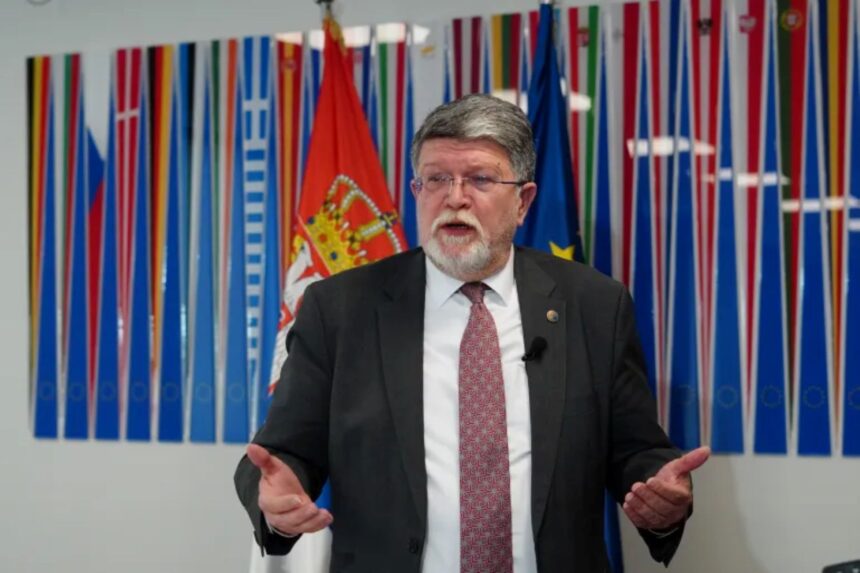At a conference discussing EU enlargement in today’s geopolitical climate, Tonino Picula, the European Parliament rapporteur for Serbia, said it is unrealistic for Serbia to join the European Union with its current leadership. Alongside Belgian MEP Kathleen Van Brempt and Austrian MEP Andreas Schieder, Picula warned that Serbia’s political direction is incompatible with EU standards.
Speaking at the press conference organized by the Socialists and Democrats group in the European Parliament, Picula pointed out that Serbia, despite being the most influential candidate country, is pursuing a multi-vector foreign policy — simultaneously aligning itself with the EU, the United States, Russia, and China.
“It is not possible to sit on four chairs at once,” Picula said, criticizing President Aleksandar Vučić’s balancing act between East and West. He argued that Vučić’s true ambition is not EU membership, as it would require Serbia to meet strict EU standards in areas like democracy, media freedom, and minority rights — standards that the current government is not willing to adopt.
Asked directly whether Serbia could join the EU under Vučić’s leadership, Picula answered indirectly, stating that without a radical shift in attitudes and behavior, Serbia’s goal of concluding accession talks by 2026 is unachievable.
“Ultimately, it is up to the citizens of Serbia to choose their government, and up to EU institutions to assess whether Serbia meets the required standards for membership,” Picula emphasized.
Montenegro and Albania Lead, Kosovo and Bosnia Lag Behind
Currently, Montenegro and Albania are leading the EU accession process, while Serbia has not opened a single negotiation chapter in the past three years. North Macedonia remains stalled due to bilateral disputes, and Bosnia and Herzegovina and Kosovo are at the bottom of the list.
However, Picula warned that Montenegro’s progress could be at risk, as the country’s strongest political force is in coalition with a pro-Serbian and openly pro-Russian faction. He added that Vučić is unlikely to allow Montenegro to distance itself too much from Serbia on its European path.
EU Enlargement Appetite Waning, But Hope Remains
The last EU enlargement took place in 2013, when Croatia joined, marking the longest gap in the bloc’s history without new members. While each successive crisis reduced enthusiasm for enlargement, the Russian invasion of Ukraine brought renewed momentum, leading to Ukraine and Moldova joining the list of candidate countries.
“Enlargement is a peace project,” said Van Brempt, emphasizing the need for one or two successful examples to sustain the process and complete it within the next 10 to 15 years.
Calls for Stronger Action on Dodik and Electoral Reforms in BiH
The MEPs also welcomed Germany and Austria’s decision to ban Milorad Dodik, president of Republika Srpska, from entering their countries, expressing hope that others would follow. Picula described Dodik as a product of Bosnia’s dysfunctional post-war political system and said he “must be arrested.”
On the electoral law issues within the Federation of Bosnia and Herzegovina, Picula stressed the need to respect rulings by the Constitutional Court of Bosnia and Herzegovina to ensure balanced representation.
Austrian MEP Andreas Schieder noted that Bosnia’s political scene is dominated by ethnic issues instead of much-needed focus on social and economic problems affecting citizens’ daily lives.







